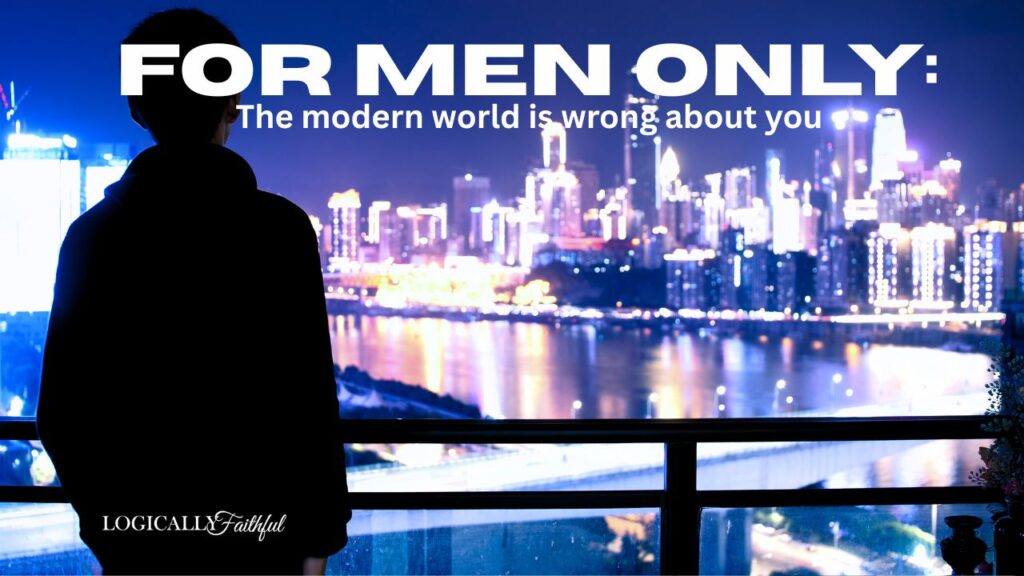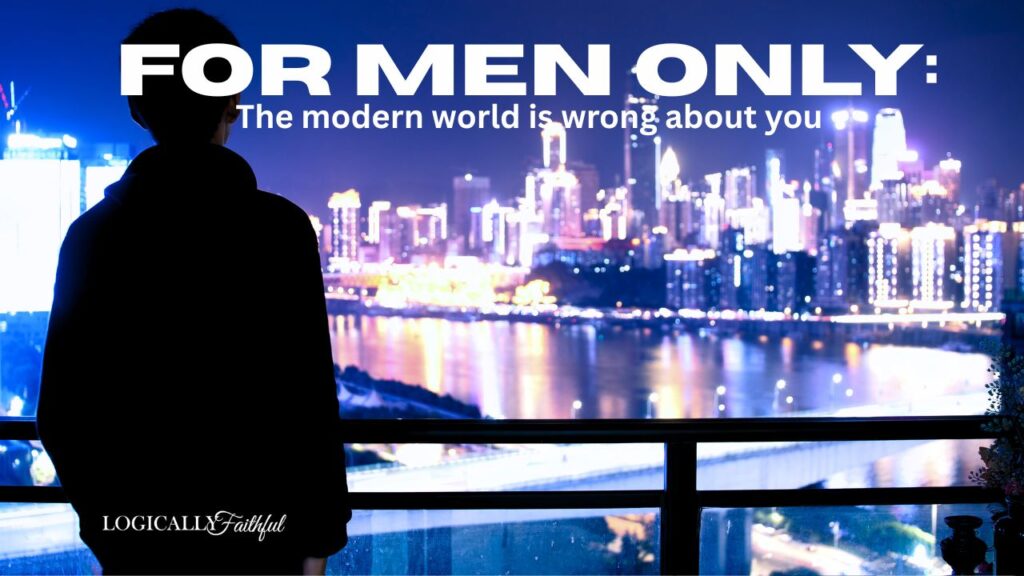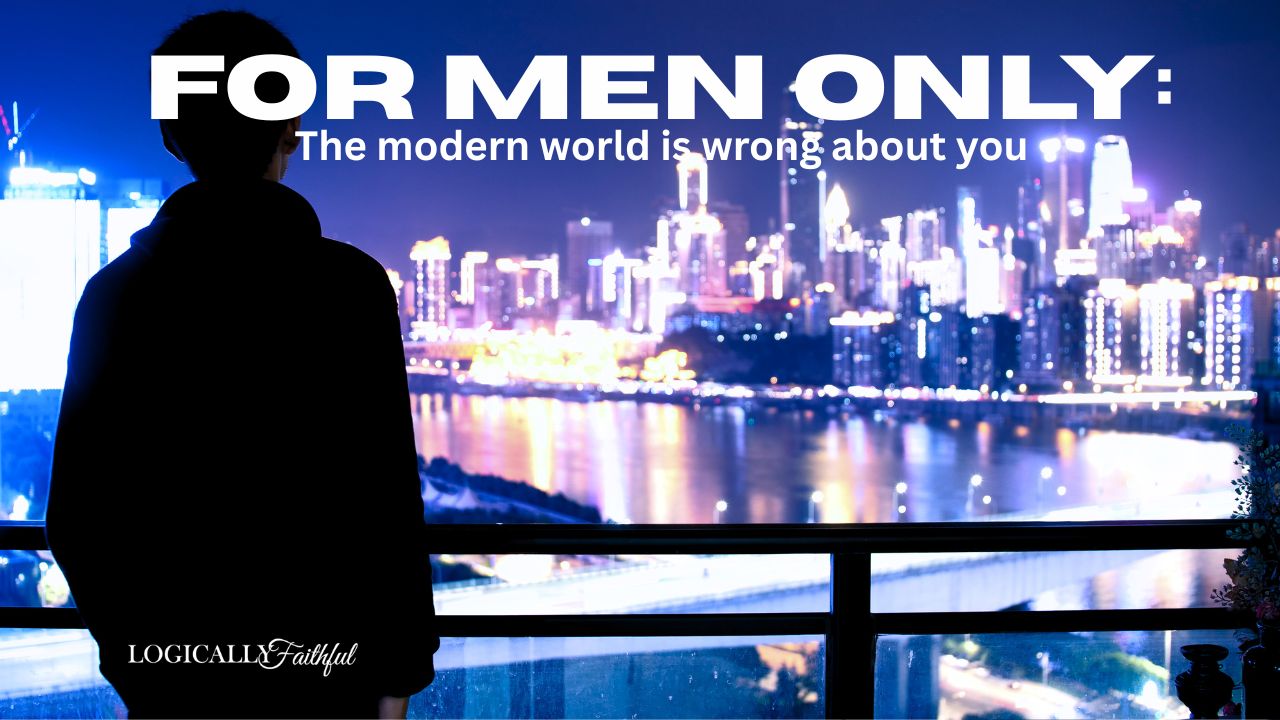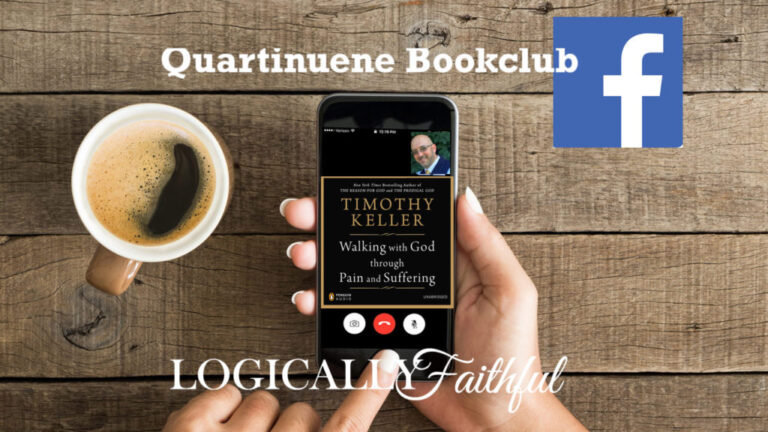Let’s start with an uncomfortable truth: While a modern woman can openly say she’ll only date men who are 666 (six figures salary, six pack and 6’0 feet) ) and society calls it “knowing her worth.” But if a man admits he prefers a woman who isn’t obese, or fat, who takes care of herself, who hasn’t surrendered to mediocrity, and not promiscuous, he’s labeled a misogynist.

This isn’t just hypocrisy—it’s psychological warfare against men.
This is not only dishonest—it is soul-warping gaslighting. And for men who have walked through the valley of heartbreak, rejection, and spiritual desolation, the desire for beauty is not narcissism—it is resurrection.
What the Modern World Gets Wrong About Men
The modern world has forgotten what men are for. It either mocks them or mistrusts them. Popular media caricatures masculinity as either buffoonish or dangerous. The moment a man aspires to lead, to protect, to build something lasting—he’s told to sit down, shut up, or soften up. Young men are taught that ambition is arrogance, that strength is toxic, and that any expression of traditional manhood is oppressive. The result? Millions of men feel aimless, ashamed, and quietly enraged. They are disconnected from purpose, wary of commitment, and drowning in distraction.

Peer-reviewed research confirms a consistent trend in media depicting modern fathers as buffoons, epitomized by characters like Homer Simpson. A 2021 study in Psychology of Popular Media by Scharrer et al. found that over 50% of father portrayals in top U.S. sitcoms from the 2000s onward showed them as humorously foolish—up from 18% in the 1980s—indicating a growing pattern of paternal incompetence played for laughs. Similarly, a 2016 Brigham Young University study of Disney Channel sitcoms reported that fathers were shown as bumbling in nearly 40% of scenes, with almost half of children’s reactions to them being negative. This shift from the authoritative, wise figures of early television (e.g., Ward Cleaver) to the clownish, inept dad has been widely critiqued for shaping cultural perceptions of fatherhood, often undermining the value and competence of real-life men.
But here’s the deeper tragedy: these accusations stick not because they are true, but because men have not been given a higher vision of who they are and who they could be. What if masculinity wasn’t the problem—but the missing solution?
You Are a Moral Agent With Depth and Weight
You are not a machine. You are not simply a bundle of instincts or a walking resume. You are not a follower count or a performance metric. You are, as C.S. Lewis reminds us, “no ordinary people. You have never talked to a mere mortal”(Lewis, The Weight of Glory, 1949). There is something immeasurable about you. Every choice you make either builds or erodes the invisible architecture of who you are. In an age that ridicules masculinity or reduces it to caricature, reclaim the truth that being a man means standing for something beyond yourself.
Jordan Peterson puts it bluntly: “The purpose of life is finding the largest burden that you can bear and bearing it” (12 Rules for Life, 2018). The deepest meaning comes from responsibility. If you want to matter—choose to carry something that matters.
Resist the Lie That Comfort Will Save You
Comfort is not salvation. Video games only go so far. In fact, unchecked comfort will rot you. Growth requires discomfort, and the best things in life often come wrapped in pain. Tim Keller said, “You don’t realize [what truly matters] is all you need until it’s all you have” (Walking with God through Pain and Suffering, 2013). Life strips you down—so you can find what’s real. C.S. Lewis offered this sober warning: “God whispers to us in our pleasures, speaks in our conscience, but shouts in our pains: it is His megaphone to rouse a deaf world” (The Problem of Pain, 1940). Whether or not you believe in God, pain has a way of shaking you awake.
Listen to it. Learn from it. Comfort lulls you to sleep. But discomfort can shape you into someone you might actually respect.
You Are Called to Forge Order from Chaos
Life is chaos—but you are not helpless before it. You are built to respond. You are made to take what’s raw, what’s broken, and forge it into something meaningful. This is your task: to take responsibility not just for what is, but for what could be. Whether it’s your job, your relationships, or your mind—create structure, carve purpose, and speak truth into the void.
Courage is not simply one of the virtues, but the form of every virtue at the testing point.
When life tests you—and it will—choose to show up with courage, not cynicism.
Don’t Settle for the Small Story—You Were Made for the Grand Narrative
So many men today are sleepwalking through a script written by someone else. They’ve traded their story for distractions: endless scrolling, meaningless relationships, simulated achievement. We’re collapsing under the weight of our own self definitions. You are more than your preferences. More than your curated image. You’re part of a much bigger story—one that involves risk, sacrifice, and the possibility of redemption.
You don’t need to believe in cosmic warfare to know that every day you’re fighting against apathy, distraction, and despair. Don’t waste your life on a story too small for your soul.
Be the Man Who Owns His Failures and Builds Again
You’ve screwed up. Welcome to the club!! So have I!
The great men are not the flawless—they’re the ones who refused to stay fallen.
You can’t go back and change the beginning, but you can start where you are and change the ending.
That’s the paradox of real masculinity: it’s humble enough to admit its faults and strong enough to do something about them. Tim Keller wrote, “We are more flawed than we ever dared believe, yet more valued than we ever dared hope” (The Meaning of Marriage, 2011). This isn’t self-help fluff—it’s the hard truth. You are not finished.
Not yet. Peterson reminds us to “Stand up straight with your shoulders back” (12 Rules for Life, 2018). Not out of arrogance, but because the world needs you standing tall. And so do you.
In recent years, films like I Feel Pretty, Barbie, Isn’t It Romantic, Sierra Burgess Is a Loser, The DUFF, and Good Luck to You, Leo Grande have taken up the mantle of Shallow Hal, shaming men as superficial, visually driven, and emotionally underdeveloped. These movies often portray male desire as shallow by default—reducing men to clueless, appearance-obsessed beings who must be “re-educated” through humiliation, reversal, or female empowerment. Whether it’s Amy Schumer’s magical self-confidence suddenly making her attractive to men (I Feel Pretty), or the literal mocking of masculine identity in Barbie, the cultural message is clear: men must grow up, look deeper, and stop valuing beauty—unless it’s inner, ironic, or entirely redefined on female terms. The result is a modern genre of romantic or satirical cinema that doesn’t just challenge superficiality—it indicts masculinity itself as morally suspect unless it conforms to a revised, often feminized standard of emotional virtue.

Consider the movie, Shallow Hal (2001) American romantic comedy film starring Gwyneth Paltrow and Jack Black about a man who falls in love with a 300-pound (140-kilogram) woman after being hypnotized into only seeing a person’s inner beauty. Directed by the Farrelly brothers, “Shallow Hal,” the overweight character, Rosemary, was portrayed by Gwyneth Paltrow. However, Ivy Snitzer was cast as her body double for close-up shots and some full-body shots of Rosemary. Let’s talk about Shallow Hal. Yes, the 2001 film that tried to bludgeon you into moral enlightenment with a laugh track and a hypnotist. The movie’s central premise is this: a shallow man, Hal (played by Jack Black), is hypnotized to see only a person’s inner beauty. Consequently, he falls for Rosemary, a woman who, we are told, weighs 300 pounds but appears to him as slim, radiant Gwyneth Paltrow. And we’re supposed to learn something profound—something warm and moral—about love and the soul.
But let’s tell the bloody truth for once: the movie actually proves the opposite of what it preaches.
You see, the directors—Peter and Bobby Farrelly—wanted to shame society for its superficiality. Noble goal, I suppose. But then they cast Gwyneth Paltrow—yes, Gwyneth Paltrow—as the representation of Rosemary’s “inner beauty.” So even when we’re being told not to be superficial, we’re shown that beauty still looks like Gwyneth Paltrow. Think about that: they couldn’t bear to make the audience sit through a full romantic arc with an actual 300-pound woman on screen, so they literally superimposed beauty onto her using a body double and a Hollywood goddess.
That’s not moral transformation. That’s cowardice wrapped in cinematic gaslighting.
Now look—I’m not saying that kindness, intelligence, grace, and loyalty aren’t beautiful. They are. In fact, they’re essential. But the body matters. It always has. It always will. And pretending it doesn’t is not virtue—it’s delusion.
The real tragedy of Shallow Hal is not Hal’s original shallowness. It’s the culture’s unwillingness to face the facts: attraction is not infinitely malleable. It’s not just a switch you flip with a hypnotist’s suggestion or a well-meaning sermon. It’s an embodied experience. It’s rooted in biology, instinct, and aesthetics that are deeper than moral lectures.
We are not floating minds disconnected from our physical forms. That’s a gnostic heresy, not wisdom. And when Hollywood tries to virtue-signal by telling us “looks don’t matter,” but can’t even bring itself to show us a full romantic arc between a man and a non-Hollywood-standard woman, what it’s really doing is this:
Confirming that beauty does matter—immensely.
Gwyneth wasn’t cast by accident. She was cast because even in a moralistic fairy tale, the storytellers know the truth: a beautiful woman, externally and internally, is aspirational. And no amount of hypnotic suggestion can override centuries of biological and cultural intuition.
So what should real men do?
Become the Kind of Man You’d Want Your Daughter to Marry
Think bigger. If you had a daughter—would you want her with a man like you? If the answer is no, change. Now. You don’t need to be perfect. You need to be growing. Men are not born great—they become great by wrestling with reality until it bleeds truth. Tim Keller wrote, “The essence of masculinity is the sense of responsibility to initiate and to lead for the benefit of others.”
That means taking initiative, not waiting to be rescued. It means building a soul strong enough that others can lean on it.
You want a high-value, deeply feminine woman? Then stop chasing women and start chasing excellence.
Stop numbing your pain and start transforming it. Stop blaming the world and start blessing it. You were born a male. But being a man? That’s a decision. Make it. Now.
Get the Hell Up—You Were Not Made to Lie in the Dirt
You were not born to drift, scroll, and self-soothe. You were made to build, to bleed, and to bear weight. Every hour wasted in passivity is an insult to the man you could become. The world will not hand you meaning—it demands that you carve it from stone. Jordan Peterson puts it this way: “Pick up your damn suffering and bear it. And try to be a good person so you don’t make it worse.” Life is brutal, but you weren’t meant to be soft. Stand up. Clean your room. Fix your posture. Apologize when you’re wrong. Fight when you must. You don’t need another excuse. You need a mission. A man without a mission will always look for distraction. But a man with a mission becomes dangerous in the best way possible.
Forge a Life Worth Submitting To
Women don’t follow weakness—they test it. And they should. A woman who is truly feminine doesn’t want to lead a man; she wants a man who can lead himself. She wants to feel safe—physically, emotionally, and spiritually. That doesn’t mean domination. It means direction. It means she can rest in your strength because you’ve proven yourself worthy of her trust.
You want a woman to honor you? Then earn it. Build something—anything—that outlasts your ego. Create stability from chaos. Govern your emotions, your time, and your tongue. If you can’t lead yourself, you have no business asking anyone else to follow you.
Don’t pretend what you don’t want.
Don’t lie. Don’t pretend you’re a better person because you deny what you know to be true. Beauty inspires. It moves. It draws us upward. But if it’s not anchored in virtue, then it becomes an idol—an Instagram goddess with no soul.
In his excellent article “The Girl You Want May Not Exist: How Pride Keeps Some Men Single” Greg Morse argues that:
Brother, the mirror can be a cruel prophet—especially when it tells the truth.
Morse speaks with the authority of someone who has seen himself clearly, and that is no small thing. It takes courage to admit you stood in your own way. That the standard you raised wasn’t about virtue but vanity. That you cloaked your fears in “discernment” and your insecurity in “high standards.” He names the disease for what it is: self-endeared love. And that disease is quietly destroying the souls of many men today. Because let’s be honest: some of us are not single because God hasn’t provided—but because we’ve made an idol of our preferences and called it wisdom.
Morse’s words strike because they are not exaggerated—they are familiar. We’ve all met “her” in our minds: the woman who is stunning, spiritual, witty, wild, and wise—who’s somehow into hiking, homemaking, and Kierkegaard. She’s a dream stitched together from YouTube clips, Instagram reels, dating apps, and the anxious projections of our own insecure egos. And when real women—godly, growing, glorious women—stand before us, we can’t see them. Not because they’re lacking, but because we’re blind. Because what we’ve really wanted is ourselves in feminine form. That’s not love. That’s narcissism in disguise.
Here’s the truth: you are not God’s gift to women. And the woman in front of you—faithful, forgiving, perhaps even flawed—is not beneath you. She may be better than you, but you’ll never know it if you keep searching for a fantasy. The longer you worship your “ideal,” the more you betray your real calling: to become the kind of man who can cherish a woman for who she is, not what she performs. The goal is not to find perfection. It’s to build something sacred—together. And that starts with humility. With seeing her, not through the lens of your expectations, but through the possibility of covenant.
So let this be your wake-up call. Your pride won’t keep you warm at night. Your list won’t hold your hand when your parents die. Your fantasy won’t challenge you to grow when you’re tired, confused, or weak. Only a real woman, with her mystery, her strength, her imperfections and fire—can do that. If you’re still waiting for “all graces to be in one woman,” you might die waiting. But if you dare to love someone real—someone human—you just might become a man worth following.
Beauty and affection and Beautiful and Good
Love, if it is to endure, must be built on respect, admiration, shared values, and—yes—mutual attraction. It’s not wrong to want someone who takes care of herself. It’s not “fatphobia” to desire fitness, grace, and health. It’s not shallow to want a woman who lights you up just by walking into the room. It’s only shallow if that’s all you want.
Let’s not pretend the body doesn’t matter. It does. It’s the temple of the spirit. And the truth is, what you do with your body is a reflection of your soul. The people who pretend otherwise often have something to hide.
So don’t buy the lie of Shallow Hal. Buy the truth—brutal, redemptive, inspiring: that beauty is not enough, but it is not irrelevant. And neither are you.
Song of Solomon celebrates sensuality. Proverbs 5:18–19 tells the husband: “
May your fountain be blessed,
and may you rejoice in the wife of your youth.
19 A loving doe, a graceful deer—
may her breasts satisfy you always,
may you ever be intoxicated with her love.
Beauty of a woman speaks to the soul of a man not just his member!
A beautiful woman—one who carries herself with grace, warmth, and strength—does more than stimulate a man’s senses. She stirs his spirit. She validates his labor, honors his discipline, and calls him to life. For the man who has suffered through failed relationships, who has questioned his worth in the silence of an empty home or the coldness of a disconnected partner, to stand beside a woman he genuinely desires is not vanity—it is healing.
Attraction, particularly for men, is not merely biological. It is also deeply psychological and profoundly theological. Beauty reflects order, and order reflects glory. In a world that celebrates chaos and mocks masculine desire, a beautiful woman who respects, admires, and chooses you over all others becomes a holy witness to your dignity.
But here’s the deeper truth: our desire for a beautiful partner is not always inflated ego—it’s often the echo of Eden. We long to behold something lovely and feel worthy in its reflection. This isn’t about domination. It’s about affirmation. It’s about hope. Yes, some men are shallow who only want that. That is undeniably true.
Scripture doesn’t cancel beauty—it reorients it. Proverbs 31 doesn’t negate physical allure; it simply prioritizes character over it.
The woman worth pursuing is both beautiful and God-fearing.
She’s not a filtered Instagram mirage nor a transactional partner offering compliance in exchange for provision. She is a woman who is strong in spirit, modest in heart, loyal in suffering, and radiant in presence. This is not too much to ask. It is wisdom to desire it. And it is manly to pursue it.
But modern culture tells men to “look past looks” while encouraging women to “level up” to wealthier, taller, and more dominant partners. The irony is searing. Hypergamy is praised. But a man’s aesthetic standards? Mocked. Obesity is now “body positivity.” Meanwhile, an average man who mentions fitness is labeled “fatphobic.” This is not equality. It’s a war on reality.
Admiration and the Masculine Soul
A relationship thrives when a woman feels loved—and a man feels admired. Not obeyed. Admired. When a woman looks at her man and says, “I’m proud of you. I choose you,” it fuels his masculinity. It allows him to lead with strength and serve with tenderness. And it invites her into a fuller expression of her femininity—softness, sweetness, radiance.
Without this dynamic, the relationship withers. If a man “settles” for a partner he does not truly admire or who does not truly admire him, it is a slow spiritual death. It is a betrayal of both their destinies.
Yes, we want beauty. But not Instagram beauty. We want a woman who is radiant with godliness, magnetic in spirit, and fiercely loyal in hardship. We want her to want us—not out of convenience or compromise, but out of conviction.
Never worship her.
She is not your salvation. She cannot carry the weight of your soul. No woman, no matter how radiant, will heal the wounds you refuse to confront in yourself. She can be your muse, your companion, your fire—but she cannot be your foundation. If you don’t believe in God, fine—but then don’t make her your god. Don’t build your identity on whether she chooses you, desires you, or validates you. That kind of pressure will crush her—and destroy you. A good woman deserves to be loved, not worshiped. Pursue her with strength and integrity, not neediness and idolatry.
If you do worship her, she will disappoint you and lose interest in you. A woman who is put on an alar or pedestal will not respect a man who does that. A real girl will respect a man who believes or tries to believe in something or someone like God, who is greater than him.
Reality Check: What If She Never Comes?
Let’s be honest: she might not come. The woman you pray for may not walk into your life this year—or even in this life. That doesn’t mean God has abandoned you. Your story is not a romantic comedy. It’s a pilgrimage. And Christ is your first love.
Proverbs 18:22 says, “He who finds a wife finds a good thing and obtains favor from the Lord.” But this does not mean your life is cursed without her. Your value is not dependent on her arrival. Your worth is in who you are becoming and Whose you are.
Marriage is not the finish line. It’s a gift. And if that gift is not granted, you have not failed. You are not forgotten. You are not broken. You are becoming—shaped by fire, forged for impact, destined for something more than fleeting comfort.
Final Word: Let Beauty Inspire, Not Enslave
Desire her beauty. Rejoice in her presence. But never let her become your god. She is not your savior. Christ is. If you don’t believe tht
A woman who fears the Lord is to be praised—and so is the man who holds out for a woman who sees him not as a stepping stone or a trophy but as her chosen leader, lover, and protector. Together, they reflect the beauty and glory of God in ways Instagram could never capture.
Let the world mock you. Let them call you shallow. You walk on. Because you are not chasing a fantasy. You are answering a call—a call to love deeply, live wisely, and lead boldly in a world that has forgotten how.
You are not just a man. You are a man in the image of God.




